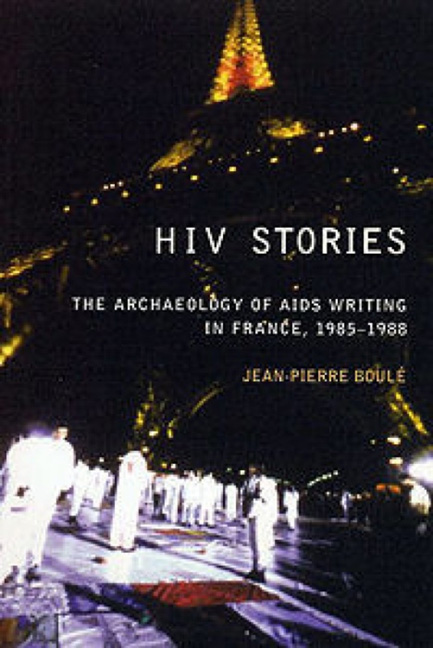Introduction
Summary
This book offers an archaeology of AIDS writing in France from 1985 to 1988. The main focus is on the moment of the irruption into discourse of AIDS writing. I want to look at two aspects of this moment: the problem of how to write about a new and taboo topic, and the problem of the frameworks of discourse that are produced/ reproduced in such writing, particularly the difficulty of breaking out of certain constraints. As an archaeological enterprise, my book disinters a body of writing about AIDS that appeared in France between 1985 and 1988 from the cultural oblivion to which most of the texts have been consigned. The six texts under consideration are written in the first person singular. They have various labels: ‘real life/true story’ (‘histoire vécue’), diary, testimony, interview, confession, autobiography; at the outset, they could all be said to be ‘autobiographical narratives’ of some sort. Another common denominator is that none of them was presented as a ‘novel’. This book is a study of AIDS writing as opposed to a study of AIDS novels. I have used the term ‘archaeology’ in the title, a term associated with Foucault's method, but I would not claim that my reading is strictly Foucauldian, notably because of my psycho-social approach. I am aiming to write a history of the past by excavating meanings and practices around AIDS texts during the period in question, and by bringing to light what has been covered up, since almost no critical attention has been paid to the first writers in the AIDS field. Hence my reading has elements of archaeology (trying to uncover buried statements from discourses) but also of genealogy, since I am looking at power and knowledge relations.
The specific virtue of addressing early AIDS writing is discovering how and why the authors invested in a particular genre, and how their voices go from being ignored, to being muffled, to being heard, before finally being eternally silenced (hence the study of genre is itself part of the struggle to find a voice or a form). Some startling facts emerge about the earliest AIDS writings in France. These were not, as was the case in other countries and with subsequent writing in France, predominantly gay.
- Type
- Chapter
- Information
- HIV StoriesThe Archaeology of AIDS Writing in France, 1985–1988, pp. 1 - 28Publisher: Liverpool University PressPrint publication year: 2002



